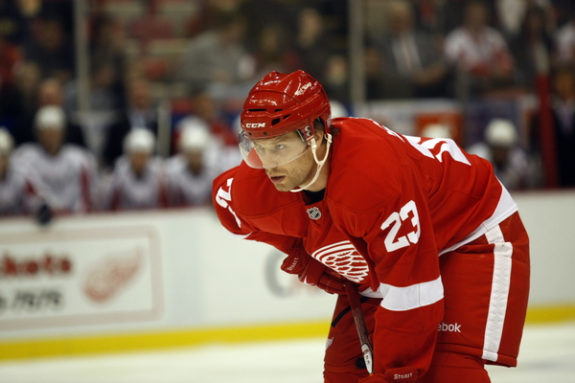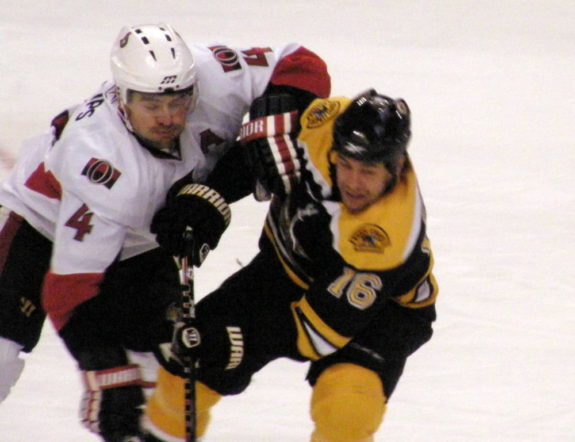The ’12 Days of Christmas’ is a classic holiday song first published in its current form in 1908. In a nod to the classic carol, join The Hockey Writers as we countdown the 12 Days of Hockeymas. Each day, we will provide you with a piece of hockey history as we eagerly await the start of the 2020-21 NHL season.
I remember getting ready to watch the San Jose Sharks play the Dallas Stars on November 30, 2005. It had been a frustrating year for the Sharks as the league had just suffered through the lockout 2004-05 season and team was off to an 8-11-4 record after starting 8-5-1. Something seemed like it needed to change.
As I was listening to the pre-game show, there was discussion of the Sharks having last minute scratches. These were not just guys who were often not in the lineup, but players in the regular lineup being held out, so speculation of a trade began. I got goosebumps when I heard Sharks announcer Randy Hahn say, “Joe Thornton is coming to the Sharks.”

I could not believe that one of the best players in the league would be playing for the Sharks. I figured the organization would have had to give up something really good in order to get him – we will get to that. The bigger question is why the Boston Bruins made the trade. There was much speculation about how the Bruins would pay for Thornton, who in many eyes had been a disappointment. With the new salary cap rules and the perception of his poor performance, one of the biggest trades in NHL history was born.
Primeau-Stuart-Sturm
The price to acquire an Art Ross Trophy winner was apparently Wayne Primeau, Brad Stuart, and Marco Sturm. None of these players were stars in their own right, but all serviceable if not important NHL players. Does the sum of those three equal the value of Thornton? Many articles have been written about that. Let’s look at each of these former first-round picks.
Wayne Primeau
The younger brother of NHL All-Star Keith Primeau, Wayne was certainly not the impact player his brother was. Wayne was drafted by the Buffalo Sabres 17th overall in 1994 and played 774 NHL games, a testament to his longevity and ability to provide value to teams at a high level. His highest point total was 29 points in 72 games in 2003-04, the season before the lockout and trade. He was a tough customer for the Sharks and provided much needed grit.
Primeau played two seasons for the Bruins amassing 19 points in 101 games to go along with 115 penalty minutes. He would move on to the Calgary Flames and Toronto Maple Leafs before retiring in 2010. Primeau was easily the least-valuable part of this deal for the Bruins, but perhaps the other two pieces will turn some heads.
Brad Stuart
Brad Stuart was one of the highest draft picks in Sharks history at third overall in 1998. Unfortunately, it was also the year they won the lottery and should have been able to draft Vincent Lecavalier. To the dismay of their fans, the Sharks had already traded that pick in November of 1997.
Stuart’s legacy will forever be tied to what could have been. The Sharks had never had a true franchise center in his prime and they would ironically use Stuart to acquire their first. Some will argue that Patrick Marleau was their first franchise center, but Marleau is not a no-doubt future Hall of Famer like Thornton, Sidney Crosby, or Evgeni Malkin.
Stuart never turned into the scorer he was in junior when he got to the NHL and ended up being more of a physical presence than a scoring threat. The season he was traded to the Bruins, he scored the most points of his career with 46. He played one more season with the Bruins after the trade and then moved on to the Calgary Flames, Los Angeles Kings, and Detroit Red Wings before coming back to the Sharks in 2012-13 for two seasons.

Stuart is the only player of the four involved in this list who won the Stanley Cup, but he did not do that with the Bruins. He was a member of the 2007-08 Red Wings who hoisted Lord Stanley’s Cup. The Bruins certainly got good use out of Stuart, but it didn’t put them over the top to win their Cup.
Marco Sturm
Marco Sturm was drafted 21st overall in 1996 out of the DEL in Germany. He was a regular in the Sharks lineup beginning with the 1997-98 season. While never a big scorer, he was a defensively responsible two-way forward who could chip in with points every now and then. He was a fan favorite and did all the little things well to be a successful NHLer.

His best effort with the Sharks as far as points was a 53-point season in 2003-04. In Boston, he bested that with 57 points in his second full season with the team in 2007-08. Sturm played five seasons with the Bruins, leaving before they won the Cup in 2010-11.
What About Joe?
Thornton’s legacy is still being written, but 2020-21 will be the first season since the trade that it will not be with the Sharks. Thornton is the only player in NHL history to win the Hart Trophy in a season in which the player was traded.

Thornton currently sits 14th on the list of all-time points leaders in NHL history. Every player he has passed on this list, as well as every player left ahead of him has been inducted into the Hockey Hall of Fame.
I don’t think anyone would argue with the fact that Thornton was the best player in the trade. The other three filled a need and helped the Bruins avoid a massive pay day. That cap flexibility would eventually facilitate some key signings that would lead to a Cup win in 2010-11.
So, Who Won the Trade?
The only team between the two that has won the Stanley Cup is the Bruins. While it can’t be definitively said that they won that Cup because of the Thornton trade, they did acquire Dennis Seidenberg and Andrew Ference in the trade tree. Those two played a significant role in that Cup win.
The Bruins also had the salary cap flexibility to sign their future captain Zdeno Chara because they didn’t have to sign Thornton. Chara was probably one of the best free agent signings of the decade and certainly helped the Bruins win the Cup.
Thornton, on the other hand, transformed the Sharks into a perennial Cup favorite and while they never got over that hump with him, that isn’t exactly his fault. His 115 point in 144 playoff games for the Sharks destroys the false narrative that he wasn’t a clutch performer. Ultimately, hockey is a team game and the team couldn’t get it done.
Previous trade reviews have the Sharks clearly coming out ahead and I certainly won’t argue, but it is probably more complicated than one Hall of Famer to zero. As outlined above, it was probably more even in the end. Even though it was an absolute treat to see one of the best passers in history perform in teal, the team that wins the Cup gets the last laugh.